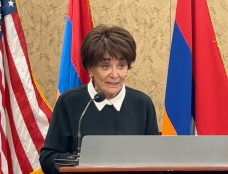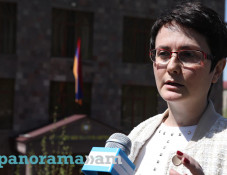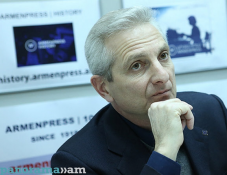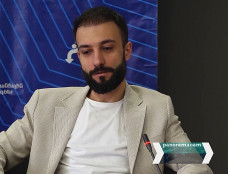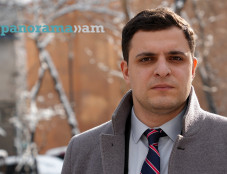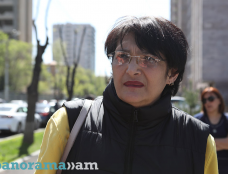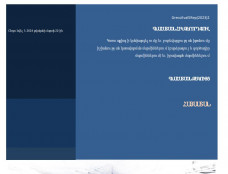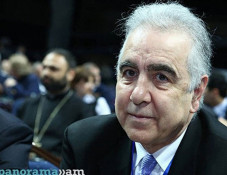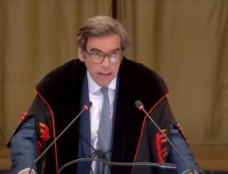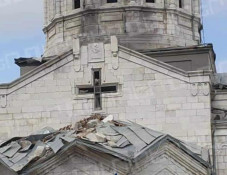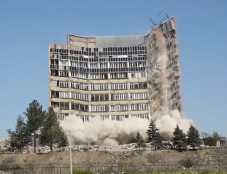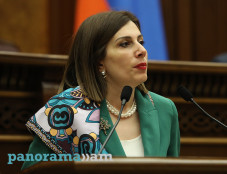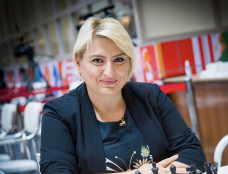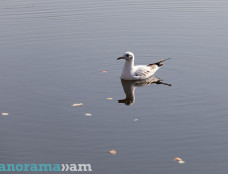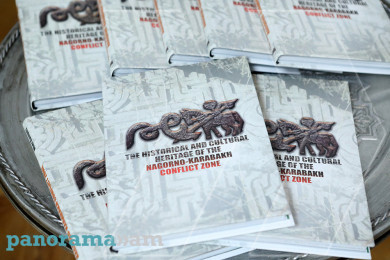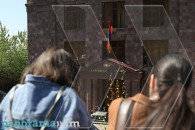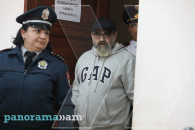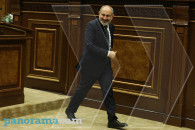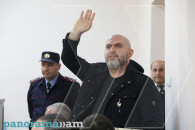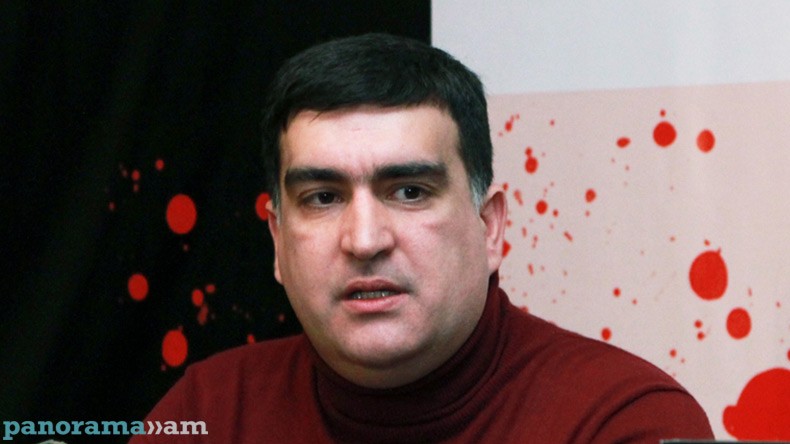
Aris Ghazinyan: Hovsep Eminplanned to free Armenia from foreign yoke with Karabakh meliks’ European military trainings
The semisovereign status of Yerevan Khanate enabled the sardar to conduct “his own policy,” which aimed at finally driving the Armenians out of the territory of the city and governorate. The Armenian clergy and the residents of the city were covered with taxes, whose sizesand frequency of payment were not controlled by the Zand metropolis anymore and henceacquired even more cynical nature. Armenian journalist and researcher ArisGhazinyan writes about it in his book “Yerevan: with a cross or on the cross,” which is an attempt of setting and considering an extremely diverse range of processes directly or indirectly forming the character of the development of the territory in question and predetermining the inevitability of turning Yerevan into the main centre of the Eastern Armenia, and later on into the capital of the recovered Armenian state.
The situationforced Catholicos Hakob V Shamakhetsito turn to Empress ElizavetaPetrovna and Georgian kings Teimuraz II and Heraclius II for support. However, such appeals were like a double-edged sword given the sharp stance the Russian authorities held regarding the Armenian Apostolic Church; on the one hand, the help of Russia could rid the khanates’ Armenian population of the Turkish domination, and on the other, the empress would most probably abolish the Holy See of Etchmiadzin, subduing it to the Most Holy Synod of the Russian Orthodox Church, Ghazinyan writes.
However, the Catholicos had no other choice than trusting upon the external help. As a result, Heraclius II of Georgiastood out with several successful campaigns on Yerevan. Meanwhile, the situation inside Georgia was soon to become complicated with Yerevan remaining the centre of the semi sovereign Turkic khanate in Persia.
In this period, Catholicos managed to restore St. Sargis’ hermitage in Yerevan, according to Ghazinyan.
In the times of sardars, the communication between Yerevan fortress and the outer city was primarily carried out through three old gates, which were completely reconstructed after the Garni earthquake. In the place wherenow the Republic Square is situated, the Bazaar (Trading) square was to be found. Here, retail trade was developing and the “Small Scales” (“mizan”) were installed. There were small stores, handicraft shops, warehouses and teahouses there. In addition, a market of used ware was functioning in the city, as well as a market of labour force, Failabazaar. The latter was a primitive “labour exchange,” where hired workers (faila) offered their all-round services.
In the middle of the 18th century, various circles of the Armenian society again started working out plans of freeing the country from foreign dominion. However, unlike the former attempts, the plans of restoring the independent state were spoken out not only by the Armenians living in the Homeland but also by the compatriots from Russia, India, Persia and Georgia proper.
As a possible capital city of the new Armenia, both the former ones, like Vagharshapat-Etchmiadzin or even Ani, which had stopped exiting by that time, and Yerevan, whose candidature was to become unequivocal, were discussed, Ghazinyan points out.
This is when the leaderof Yerevan Armenians, Melik Abraham from the family of MelikAghamalyants’, made contact with the Russian political and military circles and founded a secret organisationin the city. One of the members of the organisation was the grandfather of KhachaturAbovian, a prominent Armenian enlightener, author and educator, who wrote Wounds of Armenia, a historical novel. This was a period when the unified Armenianinstinct, which was spread all over the world, yearned for great changes.
Next, the author lists the factors, which served a base for the Armenians’ expectations.
First, Yerevan Khanate, unlike the previousadministrations, really possessed elements of self-sufficiency, and its subordination to the metropolis was often formal. The Armenian activists realised that the Zand Dynasty would never start a war against Russia because of the almost sovereign Yerevan throne, and especially against the Turkic Qizilbashesgoverning over the khanate. This circumstance gave them a free hand.
Second, Catherine II’s accession to Russian throne in 1762. Her almost 35-year-long reign marked a principally new stage not only in the strengthening of the international positions of the Russian Empire but also in the alteration of the approaches to autocracy regarding the Armenian political factor. It was different from the previous 20-year-long period of ElizavetaPetrovna’s reign, when a policy of inclining the Armenians living in Russia to the Russian Orthodoxy was conducted, and in the first year of herreign, she issued an Imperial Decree on Abolishing the Armenian chapels and churches in Saint Petersburg.
Third, the strengthening of the neighbouring Georgia with Russia’s support. In the 50s, King Heraclius II was fighting successfullyagainst the Persian Turks and the Caucasian highlanders and held glorious victories in several cases.
Forth, the weakness of the Ottoman Empire. The sultans of the second half of the 18th century appeared to be useless rulers, who were seldom healthy. For example, Sultan Osman III, who ascended the throne in 1754, ordered to banish the musicians, court poets and women from the palace (the sultan even wore special shoes with nails knocked in so that the maidservants and musicians would run away as he went up). Osman III was also extremely intolerant towards the Christians and Jews and orderedthem to wear special distinctive marks on their clothes. Seven great viziers were changed during his short three-year reign. He died of brain attack.
The combination of all these factors created a favourable climate for working out new schemes of restoring the independent Armenian state, Ghazinyan points out. According to him, the force distribution in the regional political stage, typical of the second half of the 18th century, drew unique perspectives for the Armenians to get rid of the thousand-year-long Muslim rule.
Hovsep (Joseph) Emin, who was an exceptional man personifying the “Armenian representing the European Age of Enlightenment,” was a most prominent representativeof the new generation of national activists. He devoted himself to the restoration of the independent national throne still back during ElizavetaPetrovna’s reign and Peter III’s rule. His revolutionary aspiration for quickly ridding the Homeland of foreign rule was conceived in the womb of the evolution of theArmenians spread all over the world.
“Emin was a combined character of the exiled Armenian, whose collective outlook was formed and polished during several centuries,and whose biography reflected the national fate like a mirror – his ancestorshad been in the chain of the hundreds of thousands of Armenians exiled to Persia during the Great Surgun. He himself lost family members and friends, came to know hardships and privation. He happened to be a wanderer, loader, clerk, interpreter, soldier… Atthe same time, he combined in himself the various mentalities of his compatriots spread across the world, as he had lived in Asia, Europe, Russia and the Caucasus in various years,” Ghazinyan describes.
Hovsep was born to a Hamadan-born Armenian merchant’s family. The family moved to Baghdad in the 30s, and his mother and younger brother were killed duringthe siege of the city by TahmaspQuli Khan III (the future Nader Shah). The grandfather, who sent Emin to Hamadan with his wife and four sons, brought him up. His father later joined them there from Basra and stepped into a second marriage. The Persian authorities’ violence and extortions forced the family to constantly change places of residence. Followinglong-lastingtoils, they moved to Calcutta, India. Hovsep remembered his childhood and adolescence inside the Ottoman and Persian empires all his life, Ghazinyan notes.
“The Armenian rayah” was subjected to monstrous oppressions, which were absolutely incomparablewith the scales andprinciples of the feudal exploitation in the European monarchies. The concept ‘rayah’ (deriving from the Arabian word for ‘cattle’) was a collective term used in Turkey to denote padishah’s all the non-Muslim homagers, while in Persia, it also covered some Muslim tribes, which did not belong to the ruling tribe.
As a result, Emin, who was taken with the idea of saving Armenia from Persian and Ottoman yoke and was endowed with exceptional intellect and outstanding diplomatic abilities, decided to “accumulate European abilities in himself” and devote all of him to the struggle for the Homeland’s independence. Still a young fellow, he knew about the free melikdoms – the Armenian principalities in Artsakh – and had heard about the fearlessness of the people inhabiting those mountainous lands. He later confessed that he had tied his initial plans of freeing the country from the foreign yoke with the Karabakh meliks’ exemplary European military trainings, Ghazinyan writes.
In Britain, Emin was to make friends with Edmund Burke, a parliamentarian and publicist of the Age of Enlightenment, who was the philosophical founder of the British conservatism, become the protégé of Lord Northumberland (Sir Hugh Stimsonlord, who later became one of George III’s closest advisors)… Finally, His Majesty William Augustus, Duke of Cumberland (George II and Caroline Brandenburg-Ansbach’s third son), appointed him to study gunnery and art of fortification in the Royal Academy of Woolwich.
Among his British masters are Henry Herbert (the tenth earl of Pembroke), Viscount Bolingbroke, Duke of Richmond (a prominent state figure andadvocate ofparliamentary reforms, who became a member of Pitt the Younger’s cabinet at the end of his life), Lord Cathcart (the ambassador to St. Petersburg), Lord William of Bath, Earl of Oxford, Duke Charles Spencer ofMarlborough and others.
It is significant that Prussian king Frederick II himself wanted to see Emin in his army; the “patriot from the East” took part in the Seven Years’ War for some time and made a perfect showing being very brave, and was even wounded. It is noteworthy that Sir Andrew Mitchell, the English ambassador to Prussia, who considered Emin his protégé, was categorically against his enrolment in the Prussian army. Emin himself considered his participation in the Seven Years’ War only in the context of practical skills, which were so important for carrying out military operations against the Turks and Qizilbash.
The fact that Emin’s benefactors – Elizabeth Mentegu, Duke of Northumberland, Stanhope, Lady Anson, Miss Talbot and Sofia Egerton – provided him with the necessary financial means for the trip to Yerevan, proves that they treated his idea of liberating his motherland with respect and comprehension.
It is possible to judge about the Russian interest towards this person from a letter addressed to count Mikhail Vorontsov by the Russian ambassador to England and France, AlexandrGolitsyn, “However, I have to add that this person was able to gain many people’s benevolence and protection in the court here. Duke of Northumberland, one of the first grandees of the Royal court <…> and Earl of Bath, once famous in the Parliament, provided him with protection and support, they especially recommended him to me and said many kind things about him. <…> His rare endowments and courage, as well as his honesty, are recognised by everybody here, and they assure that he has gained experience in the military art.”
To be continued
Aris Ghazinyan’s “Yerevan: with a cross or on the cross” is a book about the social and political history of Yerevan and Yerevan district (as a habitat) since the declaration of Christianity to the beginning of XIX century. In addition to demonstrating historical facts based on archive documents and sources, the book also considers the fundamental theses of the Azerbaijani historiography and Pan-Turkic ideology aimed at appropriating the historical, cultural, and spiritual heritage of the Armenians and other nations of the region by falsifying their history.
Related news
- Aris Ghazinyan: Yerevan’s Blue Mosque was constructed during reign of Persian governors from Zand dynasty
- Aris Ghazinyan: Ottoman Sultan planned to pull down Etchmiadzin Cathedral to put end to everything Armenian
- Aris Ghazinyan: Every time Yerevan rose from ashes and ruins
- Aris Ghazinyan: People surviving in various districts of Biblical highland were gathering in Yerevan
- Aris Ghazinyan: Over 350,000 Armenians from different regions deported into Persia on Abbas I’s order
- Aris Ghazinyan: Seeing Armenians’ well-ordered lands, Abbas I started working out plans of using Armenian resource in economic development of country
- Aris Ghazinyan: Armenian kingdoms appeared and disappeared in Ararat country, but Armenian element always dominated here
- Aris Ghazinyan: Timur took thousands of Armenians out of Armenia to develop crafts and trade in his empire
- Aris Ghazinyan: Yerevan became place of pilgrimage for Christians since late 13th century
- Aris Ghazinyan: Average seventh-century inhabitant of Yerevan embodied collective image of the Armenian of that time
- Aris Ghazinyan: Territory of Yerevan generates unlimited time in its limited borders
- Aris Ghazinyan: According to famous anthropologists, Armenians are descendants of ancient indigenous race, which preserved its type from any influence
- Aris Ghazinyan: According to orientalist Diakonoff's memories, most of Azerbaijani historians had “quite indirect relation” to science
- Aris Ghazinyan: Politicians and scientists in Turkey and Azerbaijan completely ignore primary sources on Yerevan history
- Aris Ghazinyan: Past and future in Azerbaijan are modeled upon decrees and program speeches of president
Newsfeed
Videos





